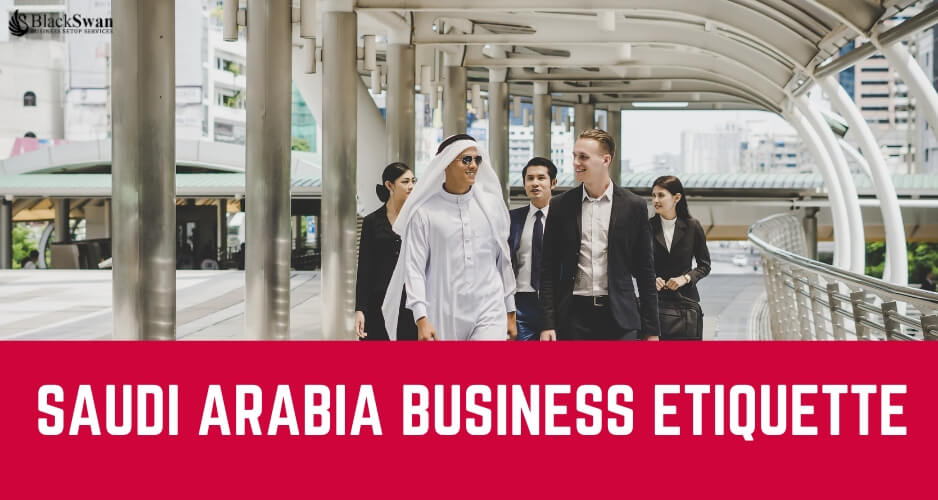Office Time
Mon-Sat: 8am to 8pm


When you enter a boardroom in Riyadh, your handshake is firm, your greeting is flawless Arabic, and your attire reflects Saudi customs. Congratulations! You’ve already set yourself apart.
Relationships are important in Saudi Arabia, and etiquette is crucial. With Saudi Arabia’s Vision 2030 boosting international investments, the country is becoming a global hub.
In 2023, foreign direct investment (FDI) reached $7.9 Billion, highlighting the nation’s rapid economic transformation. In this changing environment, Saudi business etiquette is imperative.
Below you’ll explore the top ten Saudi Arabia business etiquette you must know to ensure a lasting positive impression in the Saudi market.
Table of Contents
A successful business relationship in Saudi Arabia begins with building trust and solid relationships. Let’s look at why Saudi business etiquette is necessary:
In Saudi business culture, the handshake means more than just a greeting; it means a promise of trust between two people.
Here’s a short guide to important business customs to help you manage these interactions:
| Etiquette | Details |
| #1 Dress Code | Dress conservatively and professionally. Men should wear a suit and tie, while women should wear an abaya. |
| #2 Punctuality | Be punctual, but understand that your Saudi counterparts may be more flexible with time. |
| #3 Working Hours | Business hours are typically from Sunday to Thursday, 9 AM to 5 PM. |
| #4 Hospitality | Show appreciation for hospitality offered during meetings or meals. |
| #5 Hierarchy | Show respect for hierarchy and address senior members first. Use appropriate titles like ‘Sheikh’ or ‘Sayyid’ for men and ‘Sheikha’ or ‘Sayyida’ for women. |
| #6 Gift Giving | Offer gifts as a sign of goodwill, but avoid alcohol or pork products. |
| #7 Greetings | Greet with a handshake and maintain eye contact. For women, wait for them to initiate the greeting. |
| #8 Communication | Use formal language and avoid controversial topics like religion and politics. Small talk is important to build relationships. |
| #9 Meetings | Be patient and expect multiple meetings to build trust. Decisions are often made at the top of the organization. |
| #10 Gender Interactions | Be aware of gender-specific rules. Avoid physical contact with the opposite gender, and maintain professional behavior. |
| #11 Seating Arrangements | Allow your hosts to guide you to your seat during meetings. Seating often reflects hierarchy and status. |
| #12 Body Language | Avoid using the left hand for passing items or eating, as it is considered impolite. |
| #13 Refreshments | Expect to be offered tea or coffee during meetings; it is polite to accept. |
| #14 Follow-up | Follow up meetings with a thank-you note or a call to show appreciation and reinforce your interest. |
| #15 Decision-Making | Business decisions can take time, as consensus among senior members is valued. |
| #16 Negotiations | Expect indirect communication. Avoid aggressive bargaining and maintain patience. |
| #17 Religious Practices | Be mindful of prayer times; meetings may be paused for prayers. Friday is a holy day, so avoid scheduling business activities. |
| #18 Workplace Etiquette | Avoid rushing conversations; Saudis value relationship-building before getting to business. |
| #19 Dining Etiquette | If invited to a meal, wait for the host to start eating. Use the right hand and express appreciation for the food. |
Explore: How to Setup Your Business in Saudi Arabia Without Any Mistake?
A deep understanding of local customs and business etiquette is essential to succeeding in this market. Building strong relationships and navigating Saudi business effectively requires ten key etiquette tips.
In Saudi Arabia, a handshake symbolizes respect and trust, not merely a formality. When you walk in the door of a meeting, start with the person on the right, offer a handshake—firm but not crushing—and go around the group.
Attitudes in Liberated Arab States, Business Culture, Saudi Arabia Business Culture, Saudi Arabia Business Culture, Saudi Arabia Business Culture, Western Business Culture vs. During Ramadan, meetings can run late into the night.
Meetings don’t always start on time, so be prepared for delays. It’s viewed as normal rather than a sign of disrespect. Also, the Saudis prize relationships over timetables. So don’t hurry conversations. Let conversations start to flow before diving into business.
As Ramadan approaches (many meetings happen after Iftar or the fast-breaking, so late-night business discussions and meals are ubiquitous). The faster, the better; don’t plan meetings around prayer times.
If invited for a meal, be ready to indulge in traditional dishes such as sheep, rice, and fruit (especially dates). It is polite to accept food and take some if only a little.
Although English is an official language in most of the Middle East. And is commonly spoken in business, the effort at learning a few arabiyat, or Arabic words, will not go amiss.
Widely Spoken Languages: In terms of business, the official language in the country is English, but Arabic remains the leading language. If you are working with professionals from India or Pakistan, you might hear Hindi or Urdu.
Helpful Arabic Phrases
Dress Code
Saudi Arabia has a conservative dress culture, and that should affect professional attire.
During the negotiation itself, here are some things to keep in mind:
Incorporating these strategies can allow you to enter negotiations with poise and assurance.
Imagine walking into a luxurious office bathed by the sun over the city. As you walk in, you’re greeted with a warm smile and a handshake.
This is how to make a great first impression:
Business is often personal in Saudi Arabia. Once you have a strong personal tie, you can build lasting partnerships. Accept invitations to meals or social events. Sharing food is a great way to connect with others.
Also, Knowing someone is great, but don’t cross the line into their personal life unless welcomed. Show interest in Saudi culture and customs.
For instance, knowing the importance of Ramadan and adjusting your business hours to accommodate this festival shows great respect.
Be honest and transparent in your dealings. Trust is key in Saudi business culture, and building it takes time.
By developing personal relationships, you’ll build a foundation of trust and mutual respect from which your business relationships will benefit.
Suppose you are walking into a business meeting in Riyadh, shaking hands with a Saudi executive, and casually mentioning, “I’ve been following Saudi’s Vision 2030—your country’s transformation is incredible.” You’d instantly earn their respect.
During Vision 2030, Saudi Arabia’s economy shifted from oil to tech, tourism, healthcare, and entertainment. If you’re doing business in the Kingdom, you need to know about it.
Also, you may have heard of NEOM, an entirely clean-powered desert city. Or the Red Sea Project, a luxury tourism destination aiming to rival the Maldives. Investors, entrepreneurs, and professionals can benefit from these projects under Vision 2030.
You understand the country’s direction and see long-term potential when you mention Vision 2030. These national goals are important to Saudi professionals.
Now, let’s talk about legal stuff without the boring jargon. Saudi Arabia’s business rules can save money, headaches, and time.
You and your Saudi partner discuss a joint venture. They mention the Nitaqat system—a policy that requires businesses to hire a certain percentage of Saudi nationals. If you know about it, you can respond intelligently. If not, well, you might find yourself scrambling for answers.
Here are some key laws you should keep in mind:
So, how do you navigate all of this? Simple—talk to a local business expert. They can guide you through the legal maze, keeping you compliant while maximizing opportunities.
BlackSwan Can Assist You to Register Your Business in Saudi Arabia !
Before you start scheduling meetings, hit pause. Saudi Arabia doesn’t follow the Monday-to-Friday workweek that many Western countries do.
Here’s what you need to know:
Workweek: Runs Sunday to Thursday (Friday and Saturday are the weekends).
Office Hours:
Prayer Breaks: Expect short pauses throughout the day as businesses close for daily prayers.
Ramadan Adjustments: Working hours are typically reduced to six hours per day during the holy month.
So, planning a business trip? Be mindful of Saudi culture when scheduling meetings on Friday afternoons.
In Saudi Arabia, successful business people respect local customs. Even if you aren’t an expert on Islamic traditions, a little knowledge goes a long way.

| Do’s | Don’ts |
| Show patience, decisions take time. | Don’t talk about politics, religion, or personal matters. |
| Dress conservatively, suits for men, and an abaya (loose-fitting cloak) for women. | Don’t refuse hospitality, it’s considered impolite. |
| Acknowledge hierarchy, address senior executives first. | Don’t rush straight into business, small talk is important for building relationships. |
Yes, Saudi is business friendly. 62nd in the world on measures of ease of doing business. It has progressed in areas such as starting a business and enforcing contracts. Oil dependence and investments are at the core of Vision 2030.
Yes, you may wear jeans in public, as long as you don’t have them on too tight or too revealing. Bring cover-ups for our shoulders and knees. Jeans are fine but do not dress too casually in conservative areas.
The most common way to say “Hello” in Arabic is. Another common greeting is السلام عليكم (As-salam alaikum), “Peace be upon you.”
Saudi Arabia lifted its ban on internet calling apps in 2017 to improve business confidence. WhatsApp could only offer voice and video call services after adhering to the CITC’s regulatory requirements.
Do not make negative remarks about the royal family, religion, or politics. Avoid offending people by not respecting local customs and traditions.
Traditionally, Saudi Arabia’s business culture is based on respect and relationship-building. Understanding etiquette rules will not only help you avoid missteps but also help you build trust and value with your partners.
However, it’s not hard to do business with Saudi professionals if you approach them patiently, adaptable, and aware of local customs.
When you enter a Saudi business meeting, you won’t just be a foreign visitor if you follow our tips. Having a cultural understanding of their business will make you a respected partner.
